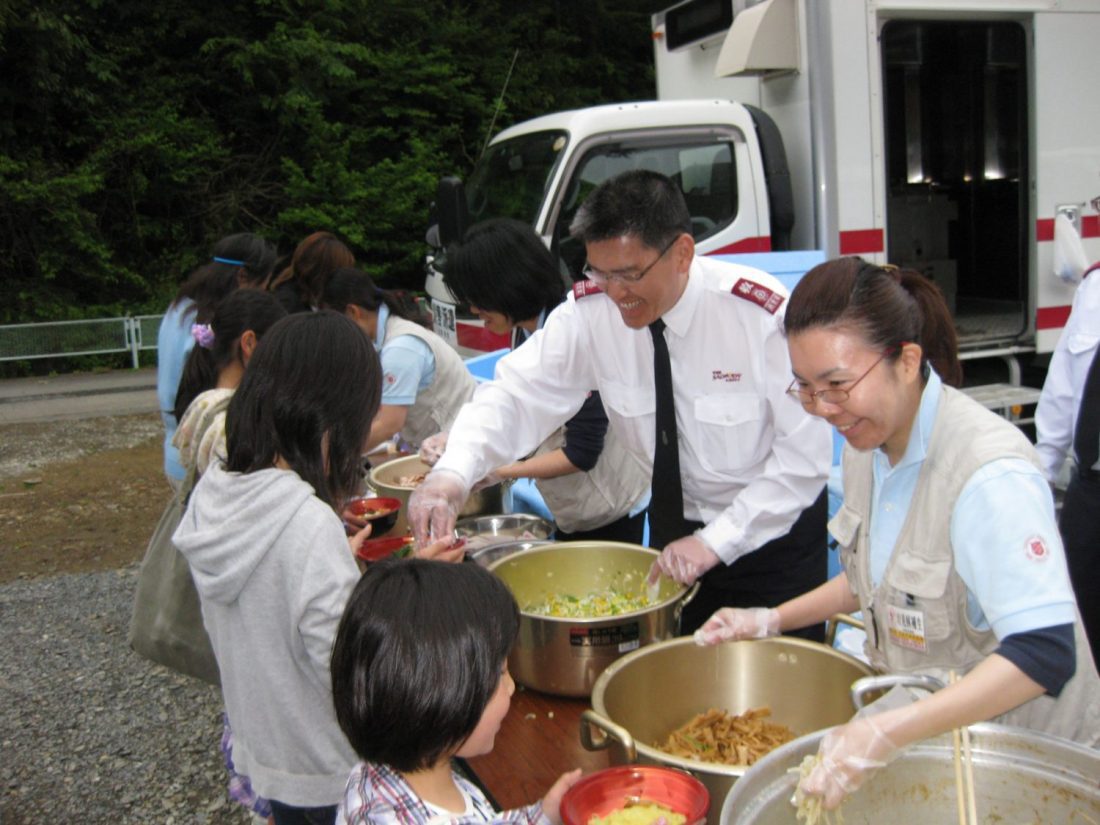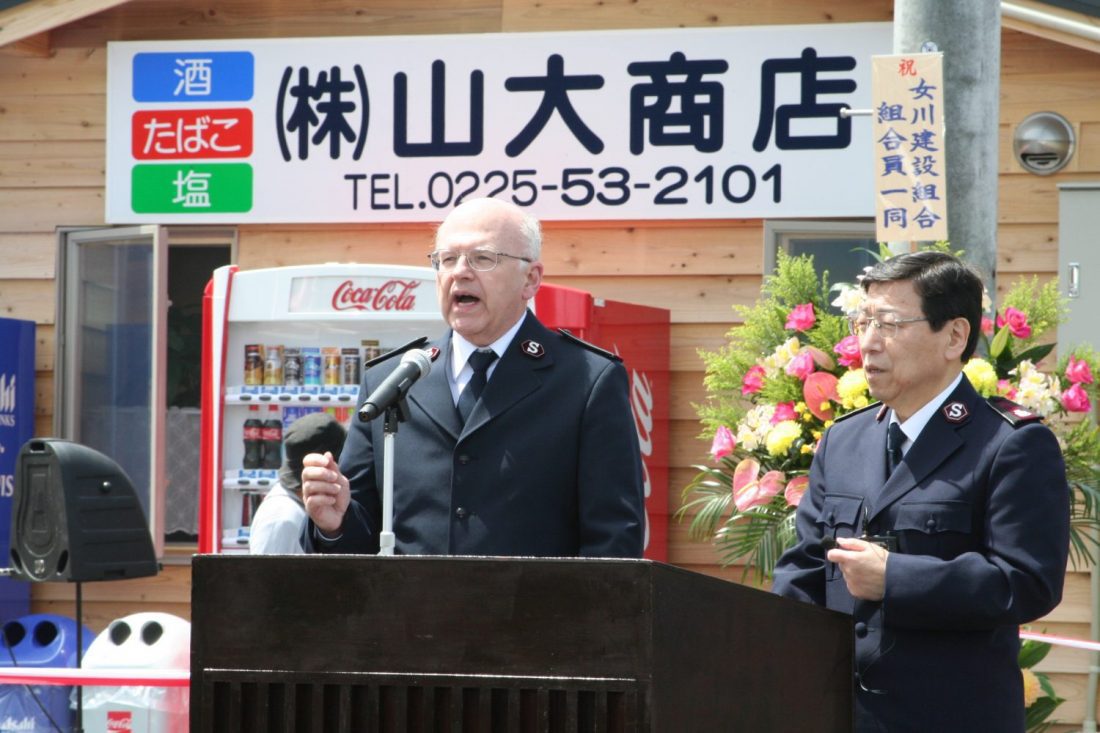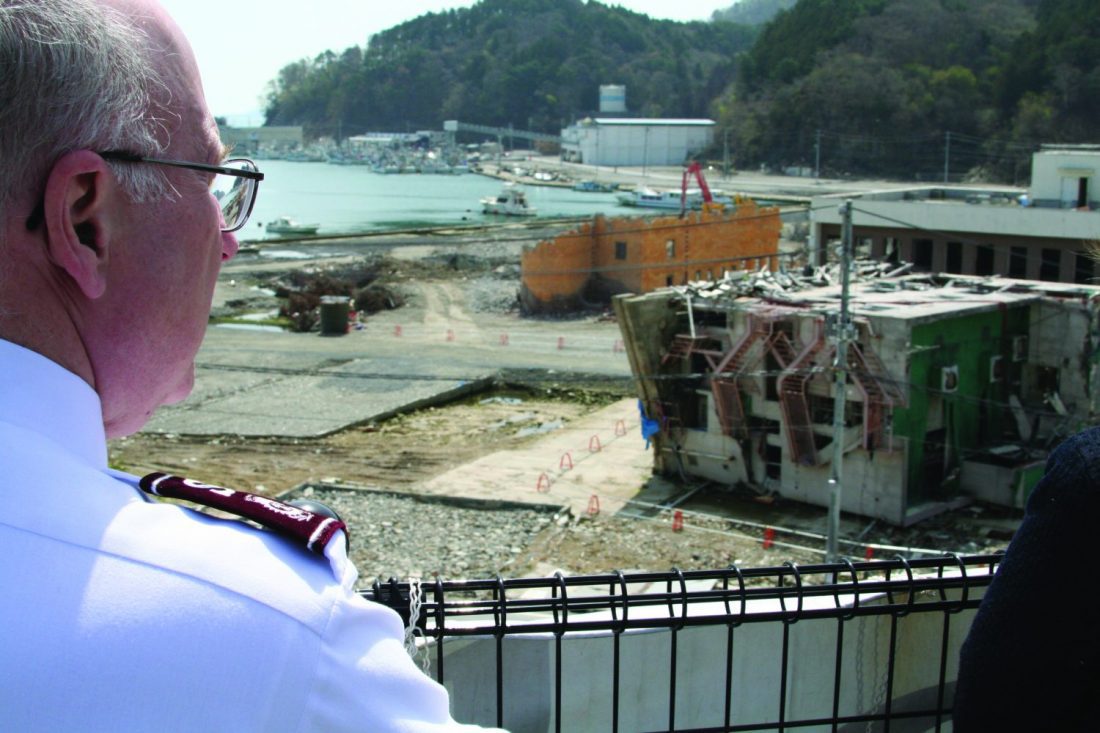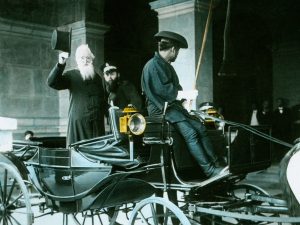In Japanese, ‘kizuna’ means a “bond of friendship.”
Born of adversity in Onagawa, Japan, kizuna has emerged between the residents, The Salvation Army Japan Territory, The Salvation Army USA Western Territory and Trident Seafoods.
On March 11, 2011, it only took minutes for a tsunami to sweep away the entire downtown area of Onagawa, taking the lives of more than 1,000 people in the fishing village of only 10,000 citizens, and leaving thousands more homeless and jobless.
Thanks to the support of millions of people around the world, The Salvation Army was on the ground within the first days of the disaster response, serving hot meals, passing out blankets and providing mattresses and heaters in Onagawa, as well as in several other coastal towns. The Salvation Army has since provided much more than temporary relief, partnering with local businesses, governments and charities to help communities rebuild.
In the immediate aftermath of the tsunami, Trident Seafoods, a large seafood company based in the northwestern United States, approached The Salvation Army about partnering on relief projects in Onagawa. Trident Seafoods has deep ties to many individuals and companies within the fishing industry of Onagawa and the surrounding region, and offered to support whatever was most needed by the people of the town. In response to needs identified by the people of Onagawa, The Salvation Army and Trident Seafoods worked with the local community to provide fishing boats and other equipment to help revive its primary industry, since nearly all of the buildings and equipment were washed out to sea.
The Salvation Army also partnered with the town to construct a temporary shopping center, which has both enabled local business owners to get back to work and provided a way for local residents to return to a more normal way of life. The new center is both a place for locals to shop for basic needs and to spend time with neighbors.
Underscoring the close relationship between Onagawa and The Salvation Army, the Territorial Commander of The Salvation Army Japan, Commissioner Makoto Yoshida and the National Commander of The Salvation Army USA, Commissioner William Roberts, were invited to the opening ceremony of The Onagawa Shopping Center in April 2012. They were joined by the Chairman and Founder of Trident Seafood, Charles H. Bundrant, as well as local Onagawa officials, shop owners and grateful citizens.
The Onagawa Shopping Center is the first shopping mall in the damaged town. Without it, shop owners and local citizens would likely have been forced to leave town to look for new jobs or to meet their basic needs, leaving Onagawa in danger of never fully recovering from the disaster. The work of The Salvation Army has offered a chance for a new life for both the town and citizens like Mr. Kato, who has a successful business in the shopping center.
Mr. Kato lost his wife and child in the tsunami. He also lost his livelihood, a Korean barbecue restaurant. Before the shopping center project started, he spent almost every day weeping and could not bring himself to start any new work. But Mr. Aoyama, the manager of the chamber of commerce and a key partner of The Salvation Army, continuously encouraged, and eventually convinced him to start a new restaurant at the temporary mall.
Major Kazuyuki Ishikawa, one of the disaster recovery coordinators for The Salvation Army, visited the now busy restaurant for lunch and Mr. Kato came out to thank him. He said, “This project brings me hope.”
At the two-year anniversary ceremony for disaster victims in April, Onagawa officials publicly recognized The Salvation Army for its ongoing support to the town.
Today, along with efforts to rebuild communities The Salvation Army is working to ensure that the most vulnerable victims of this disaster are not forgotten. It is partnering with the government and social service agencies in Myagi prefecture to provide outreach programs for children and elderly citizens living in temporary housing facilities, including health screenings, home visitations to seniors, social gatherings and after-school programs that help to ensure that people stay connected to their local communities and can get access to the services they need along the path to recovery.
[author]
By Brian Swarts
Brian Swarts is The Salvation Army World Service Office (SAWSO) assistant program director for strategic planning and manager of the SAWSO Japan disaster recovery.
Connect with Brian
website: sawso.org
twitter @sawso77
email: brian_swarts@usn.salvationarmy.org
[/author]
For this work, The Salvation Army is one of only two faith-based organizations given a commendation for excellence in social service by the Japan Ministry of Health, Labor and Welfare.
The most important honor of our work is seeing lives changed and knowing that people of Japan understand that The Salvation Army cares for them and will continue to walk alongside them as they rebuild.
Kizuna.















